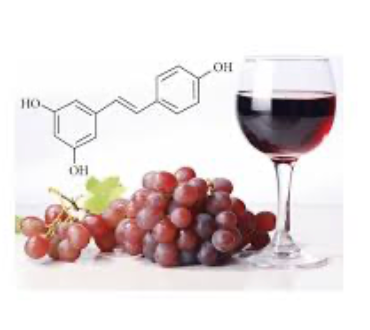Resveratrol from French Red Wine Grapes: Unlocking Superiority over Polygonum cuspidatum
May 12, 2023 – Steve Bruner

Introduction
 Resveratrol, a potent antioxidant and polyphenol, has gained significant attention for its potential health benefits. While it can be sourced from various plants, resveratrol derived from French Red Wine Grapes stands out as a superior choice when compared to resveratrol obtained from Polygonum cuspidatum, commonly known as Japanese knotweed. One of the key reasons lies in the absorption rate of transresveratrol found abundantly in grapes. In this blog post, we explore the remarkable advantages of resveratrol from French Red Wine Grapes and shed light on its higher absorption rate, offering greater efficacy and benefits for your health.
Resveratrol, a potent antioxidant and polyphenol, has gained significant attention for its potential health benefits. While it can be sourced from various plants, resveratrol derived from French Red Wine Grapes stands out as a superior choice when compared to resveratrol obtained from Polygonum cuspidatum, commonly known as Japanese knotweed. One of the key reasons lies in the absorption rate of transresveratrol found abundantly in grapes. In this blog post, we explore the remarkable advantages of resveratrol from French Red Wine Grapes and shed light on its higher absorption rate, offering greater efficacy and benefits for your health.
The Significance of Resveratrol
Resveratrol is a natural compound found in certain plants and fruits, known for its antioxidant and anti-inflammatory properties. It has been studied for its potential in promoting heart health, supporting brain function, and even extending lifespan. Resveratrol gained attention after researchers observed the "French Paradox," the phenomenon where the French population maintained good cardiovascular health despite a diet rich in saturated fats. This observation led to the discovery of resveratrol's presence in red wine grapes and its potential health benefits.
Absorption Rate of Transresveratrol
When comparing resveratrol sources, it's crucial to consider the absorption rate of the active compound, transresveratrol. Transresveratrol is the most biologically active form of resveratrol and is responsible for many of its health benefits. French Red Wine Grapes contain a higher concentration of transresveratrol compared to Polygonum cuspidatum.
Studies have shown that transresveratrol from French Red Wine Grapes exhibits superior absorption rates when consumed orally. The human body can absorb transresveratrol more effectively from red wine grapes, thanks to the presence of other grape compounds that aid in its absorption. This enhanced absorption allows for higher bioavailability, ensuring that a greater amount of transresveratrol reaches the target cells and tissues in the body.
Additional Benefits of French Red Wine Grapes
Apart from the higher absorption rate of transresveratrol, French Red Wine Grapes offer additional benefits. These grapes are rich in other valuable compounds, such as polyphenols, flavonoids, and anthocyanins, which contribute to the overall health benefits associated with red wine consumption. These compounds possess antioxidant and anti-inflammatory properties, further enhancing the positive effects of resveratrol.
Furthermore, French Red Wine Grapes undergo a meticulous cultivation and harvesting process, ensuring the highest quality and purity of the resveratrol extracted from them. The careful selection and processing techniques contribute to the superior taste, consistency, and efficacy of the final product.
Conclusion
When it comes to choosing a source of resveratrol, French Red Wine Grapes stand out as a superior option compared to Polygonum cuspidatum. The higher concentration of transresveratrol in French Red Wine Grapes, coupled with its superior absorption rate, makes it a more effective and beneficial choice. By opting for resveratrol derived from French Red Wine Grapes, you can unlock the full potential of this remarkable antioxidant, promoting your overall health and well-being. Remember, moderation is key when consuming any form of resveratrol, and consulting with a healthcare professional is advisable, particularly if you have any underlying health conditions.
